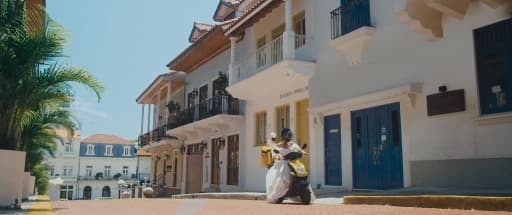“Algo Azul”, The Panamanian Film That Enhances the Image of Our Country as a Tourist Destination

Mariel Garcia Spooner
In tourism, there is always talk about the campaigns to communicate and position the country in the public’s perception, being the “30” advertising spots on television or the 1-minute spots on social networks, it is what comes to mind. Also, radio and articles that talk about tourism subject matters or destinations are used to a great extent, however, there is a platform that has been used very little within a general strategy to position the country as a tourist destination: cinema.

Cinema Boosts Culture and Traditions
Although it is a format that does not follow parameters or commercial objectives, as it is follows more to the story it wishes to tell, Mariel Garcia Spooner, Director and Screenwriter of the new Panamanian film “Algo Azul”, thinks that the country can enhance its culture and traditions , by means of cinematographic scripts that visually capture what Panama is. Although, the story that is told does not speak directly about the country, when it is filmed here, locations and real people from daily life are collected.
City Marketing
“Ana escapes from the hotel where she works dressed as a bride and decides to get married that same day. Starting a race where she must put together her wedding before being caught “, this is how the synopsis of the movie”, Algo Azul describes it. If the premise is that a girl walks many streets of Panama City dressed as a bride trying to get married, this sells Panama as a tourist destination , as explained by the Film Director.

Although her film “Algo Azul” premiered last October 21st in Panamanian cinemas, it had already been presented at the Latino International Festival in Los Angeles and the American Film Festival Institute in Wahsington. The best example that the film sells tourism to Panama is the surprise and delights reactions from the international audience. The Director explains that besides human history, people were in “awe” by the locations in the city, since many thought it would looked more like Casco Antiguo. Several comments the young Director received were “we love the way Panama looks, I didn’t know it was like that, I want to go to Panama.” Mariel Garcia Spooner believes that the country has wonderful beaches, an incredible culture and places rich in contrasts that attract a lot of attention from people in other countries.

International Scope of Cinema
One of the great advantages of cinema is that for two hours people invest all their attention in what happens with the characters. A great opportunity to have as many people as possible outside the country to enjoy the wonders of a destination, country or culture. And this is the case of the film “Algo Azul”, its Director tells that they are working on its international distribution with several companies for Latin America and Europe. The plan is to reach all possible continents and digital platforms. However, this film has already secured audiences in Central America, the Dominican Republic, Puerto Rico, Colombia, Peru and planning Mexico. Thousands of new people who will see Panama with new eyes.

Cinema for a Successful Tourism Strategy
Analyzing the words of the Young Film Director, the film “Algo Azul” enhances the image of our Capital City, connects with characters that are part of our culture and will be seen by thousands of people. It is clear that cinema is also a key element to developing our national tourism.
An analysis that Mariel Garcia Spooner sums up in her own words: “the truth is that how the country and its culture looks in the film has attracted a lot of attention, I think it is a beautiful legacy that we leave on how our main location is presented… Panama”.

Photos courtesy: Mariel Garcia Spooner







